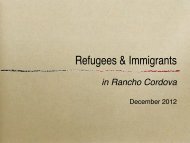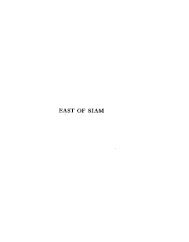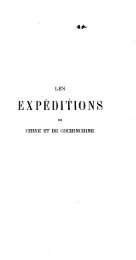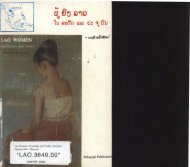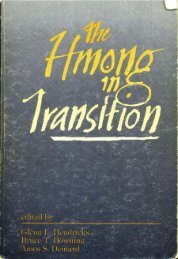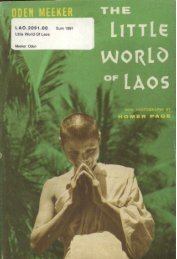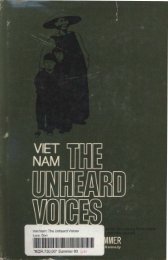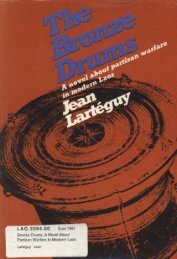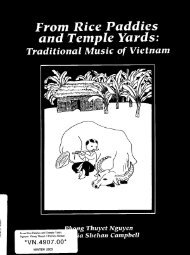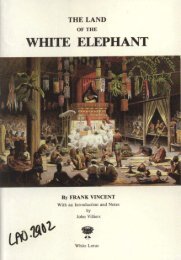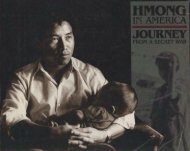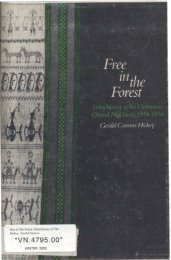PEOPLE
Grant, The Boat People - Refugee Educators' Network
Grant, The Boat People - Refugee Educators' Network
- No tags were found...
You also want an ePaper? Increase the reach of your titles
YUMPU automatically turns print PDFs into web optimized ePapers that Google loves.
The Boat hple<br />
believable, hundreds of ships bypassed bo~t people in distress<br />
sea.<br />
* * *<br />
Singapm was the first of Vietnam's non-communist neighbours<br />
start fending off boat people. It regularly rurned awmy small cr<br />
from southern Vietnam after rerupplying and refuelling chcm.<br />
late 1977 Thai security authorities wcre regularly rejecting b<br />
ptoplc, in some cases putting them on different craft<br />
had sunk, been scuttlcd or had engines damaged kyon<br />
lot of these 'push-off casts ended up in Malaysia. As the<br />
from southem Viaam intensified and boets converg<br />
north-east wart of pcniasular Malaysia, cenml and local<br />
started bloeking ~aworthy craft and giving them supp<br />
tinue their onward journey.<br />
In late 1978 the policy of turning 'seaworthy' boats away<br />
intensified. In early 1979, aftcr a special task force und<br />
mand d an army general was created to conml the<br />
the coastal cordon was tightend, Western refugee officials esti<br />
that in February about 25 per cent of those who tri<br />
aysia were 'shooed off; in April, 50 pcr cent; and b<br />
prr cent, Even so, morc than 17500 slipped ashore<br />
the government in Kuala Lumpur announced a h<br />
icy towards what it called 'illegal immigimts' from Vietnam,<br />
more would be permitted to land. Naval surveillance of the eool<br />
was intensified, Warships . kept - refugee boats away from the offsh<br />
oil rigs.<br />
Since the communist takeover of South View in April 197<br />
117 778 Indo-Chinese had arrived in Malaysia by sea. By ~une 19<br />
a total of only 42 248 had been menled, The home affairs minist<br />
Tan Sri Ghazali Shhe, said that, in he firsr six month5 of' 197<br />
Malaysia had fiuccessfuily towed out to sea 267 boars carrying mo<br />
than 40 000 Indo-Chinese.<br />
'The 'CPS~PWPY'@icy mated a rpecirl class of Indo-Chi<br />
refugcw, the so-called 'kach people'. While many boats<br />
blocked from landing in the first half of 1979, n large number<br />
aped to dudge ,Ma\aysian patrols and beach, xuttlc or dock<br />
boats, or sahtagt engines;. Thew hlockadc runners were allow<br />
ashore. Some were mnsferred to campsunder UNH~R protection, but<br />
more and more were put into makcahift centres under armed guard,<br />
on or close to the beaches where they landed, and kept under<br />
Malaysian conml. UN and western refugce officials were denied<br />
access to them, as were journalists. They were literally living in<br />
limbo, not knowing whethcr they would be transferred to UNHCR<br />
camps for ettlement, or sent back to sea.<br />
From mid-February to June, more than 5000 of the beach people<br />
were put onto boats and towed back to international waters. By<br />
mid-1979, refugee oficials estimated that, of the 75 000 Indo-<br />
Chinese in Malaysia, only about 65 000 were in UNHCR camps and<br />
transit centres. The rest - about 10 Oo men, womm and children<br />
- were in the limbo camps under imminent threat of expulsion. They<br />
wcre being loaded onto repaired refugee boats, and in some cases<br />
cven onto requisitioned Malaysian fishing craft,<br />
At a squalid bcach camp at Jambu Bangkok, on a desolate stretch<br />
of coast south of Kuala Trengganu, visited by journalists without<br />
permission on 25 June 1979, refugees complained they werc short<br />
of food and that Malaysian guards charged them the equivalent of<br />
$30 for five-kilogram bags of rice (nine times the price on the lmal<br />
market) and $1.00 per item for posting urgent letters abroad.<br />
On 3 July 1979 they were put onto four Malaysian fishing boan<br />
and rowed out to sem for twenty-four hours by a navy pad boat.<br />
The refugees said later they were cut adrift and left with little fuel<br />
or drinking water. The night after the four wooden craft were abandoned,<br />
thty drifted aparr. Miss Lieu Minh Tran, a Vietnamese high-<br />
Rho01 teacher who was in one of the boats, said she believed the<br />
other boats had sunk. 'As far as wt know thty had no more fuel than<br />
us. They couldn't have got far with their engines. Then they would<br />
have been blown about by the strong winds and knocked by the<br />
waves 8s we werc. We werc lucky. A passing ship saw us and<br />
stopped!<br />
The ship was a 1524-tonne freighter, the Seaweep, owned and<br />
Operated for refugee relief by a Christian aid organization, World<br />
Vision International, with headquarters in California. The captain<br />
of the refugee boat found by the Ssrasweep was Hua Hien Minh, a<br />
31-year-old mechanical engineer, who said they had been givcn<br />
about twenty litres of fuel - enough for about eleven hours - by





